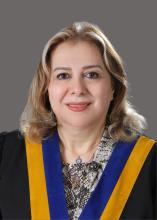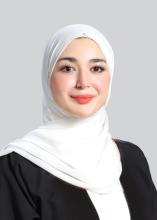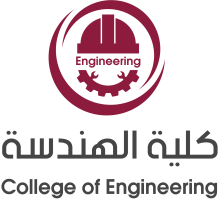Dear Students, Faculty, and Visitors,
As the Chairman of the Architectural Engineering Department, I am pleased to welcome you to our department for the academic year 2024-2025. The Architectural Engineering Department, established in the academic year 2016-2017 as part of the College of Engineering at Amman Arab University, offers a comprehensive bachelor’s degree consisting of 169 credit hours spanning five years.
Our curriculum is designed to equip our students with a solid foundation in the technical, digital, and practical skills essential to the ever-evolving field of architecture. We strongly emphasize sustainable design and green architecture principles, ensuring that our graduates are proficient in modern design techniques and capable of addressing the global demand for environmentally responsible and sustainable structures.
Through a balanced blend of theoretical knowledge and hands-on experience, our program prepares students to meet the challenges of today’s architectural landscape. Whether through studio work, cutting-edge digital tools, or real-world project engagements, our graduates leave with the ability to innovate and lead in the architectural engineering field.
I invite you to explore our department, learn more about our programs, and join us in fostering a future where architecture and engineering contribute to a sustainable and resilient built environment.
Dr. Ruba Alomary
Acting Head of the Department
About the Bachelor of Architecture Engineering
The Architecture Engineering Department is one of the important academic departments in the Engineering Faculty which was established in the beginning of the first semester of the academic year 2016/2017.
The Department of Architecture Engineering awards bachelor’s degree in architecture engineering after passing (169) credit hours. The department is currently looking forward to obtain international accreditation (NAAB) to achieve a higher degree of quality in accordance with local accreditation and international standards. The department aims to prepare a distinguished engineer who is able to create, innovate and keep abreast of engineering and scientific developments in the labor market. Based on facilities provided by the department and acquired by students, the department’s graduates have distinct opportunities at the private and public labor market alike, and are able to build their own work at a high architectural level.
The Department of Architecture engineering aims to enhance the role of the architect after completing his/her studies so that they will be able to produce innovative and practical designs, provide operational drawings and architectural plans by using modern architectural software and keep pace with green architecture, sustainable building and many other emerging topics. In addition to the architectural design, which gradually moves the student from the architecture and design scale to the city planning scale, the students of the department study philosophy, architectural criticism, theories of architecture and other courses that broaden the horizon of the student’s future as an architect.
The department has a group of specialist academic staff, assistants and laboratory supervisors who have a passion for innovation and leadership in the field of research, teaching, and sufficient experience to supply the local and international market with competent graduates who master modern and specialized scientific fields, and hold “bachelor’s degree of which a study plan approved by international universities and meets the local and international standards.
Vision
Entrepreneurship and Distinction in architecture engineering and arts, scientific research and community service locally and regionally.
Mission
Preparing staff of creative and distinguished architects supported by the knowledge, skills and ethics of the profession, able to compete, lead and contribute to achieving comprehensive and sustainable development.
Architecture Engineering Major Bachelor’s Program
Program Mission:
Providing distinguished academic programs in the field of architecture engineering, supported by the knowledge, skills and ethics of the profession through qualified staff capable of keeping pace with local and international criteria in accordance with the e-learning integration criteria.
Educational Program Objectives:
- Graduating qualified architects with advanced skills and necessary experience, able to meet the requirements of the architecture and construction market.
- Developing students' competencies in creativity, discussion skills, critical and creative thinking.
- Appreciating the architectural heritage and taking into account the cultural, social and environmental factors in the stages of the architectural design process and architectural education.
- Recognizing the priority of green architecture and sustainable building.
- Activation of the scientific research and participation in sustainable development efforts.
- Recognizing the cooperation with companies and architectural and consulting offices, and strengthening the link with the departments and colleges of architecture in local, Arab and international universities.
Educational Program Outcomes:
The expected outcomes of this program are preparing graduates competent in:
- Clarifying the basic principles of design and take advantage of design solutions for existing architectural projects.
- Understanding contemporary architectural steps in formulating theoretical trends in design.
- Applying constructing sciences and engineering systems in the design process.
- Critical analysis and mastering scientific and architectural thinking skills.
- Evaluating basic ideas to identify information, conclude justified results, and test alternative outcomes according to specific engineering criteria.
- Architectural design through the effective use of the basic principles and technology of design through professional and ethical responsibility.
Mapping of Program Educational Objectives (PEO's) with Students Outcomes (SO's)
Program Educational Objectives (PEOs)
- Graduating qualified architects with advanced skills and necessary experience, able to meet the requirements of the architecture and construction market.
- Developing students' competencies in creativity, discussion skills, critical and creative thinking.
- Appreciating the architectural heritage and taking into account the cultural, social and environmental factors in the stages of the architectural design process and architectural education.
- Recognizing the priority of green architecture and sustainable building.
- Activation of the scientific research and participation in sustainable development efforts.
- Recognizing the cooperation with companies and architectural and consulting offices, and strengthening the link with the departments and colleges of architecture in local, Arab and international universities.
Students Outcomes (SOs)
- Clarifying the basic principles of design and take advantage of design solutions for existing architectural projects.
- Understanding contemporary architectural steps in formulating theoretical trends in design.
- Applying constructing sciences and engineering systems in the design process.
- Critical analysis and mastering scientific and architectural thinking skills.
- Evaluating basic ideas to identify information, conclude justified results, and test alternative outcomes according to specific engineering criteria.
- Architectural design through the effective use of the basic principles and technology of design through professional and ethical responsibility.
Mapping between PEOs and SOs:
| PEOs | SOs |
| PEO1 | 1,3,6 |
| PEO2 | 2,4,5 |
| PEO3 | 1,3 |
| PEO4 | 1,3,6 |
| PEO5 | 4,5 |
| PEO6 | 6 |


| Number | List of Research Papers | Abstract |
| 1 | Al-Zoubi, Rafeef (2011), study on public sector’s concept of historical character of traditional buildings salt- Jordan | Download |
| 2 | Al-Zoubi, Rafeef (2011), A study on yellow stone buildings characterizing old Salt townscape – Jordan | Download |
| 3 | Al-Zoubi, Rafeef (2011), Study on the sustainability of urban planning reconstruction by promoting traditional industries by local university based on the evaluation of craftsmen, local, organizations and universities | Download |
| Number | List of Research Papers | Abstract |
| 1 | Aburamadan, R., Bichard, E., Coates, P 2015, ‘Using Design Science to Establish a Specification for Refugees Shelters’, 12th International Post-Graduate Research Conference 2015, Salford university, MediaCity UK 10-12 June 2015, pp. 144-155 | Download |
| 2 | Al-Kurdi, Nabeel, Abdel-Aziz, Dania, Al Shboul, Abdulsalam, The Impact of Using Light Transmitting Concrete on Energy Saving in Office Buildings-case of Jordan, Research Journal of Applied Sciences, Engineering and Technology 11(6): 578-586, 2015 DOI: 10.19026/rjaset.11.2016 ISSN: 2040-7459; e-ISSN: 2040-7467 | Download |
| 3 | Abdel-Aziz, Dania, Al Shboul, Abdulsalam, and Al-Kurdi, Nabeel, Effects of Tree Shading on Building’s Energy Consumption - The Case of Residential Buildings in a Mediterranean Climate, American Journal of Environmental Engineering 2015, 5(5): 131-140 DOI: 10.5923/j.ajee.20150505.01 | Download |
| Number | List of Research Papers | Abstract |
| 1 | Al-Jameli, Hanan (2016), Muqarnas form efficiency in diffusing Soundwaves within the Space | Download |
| 2 | Al-Zoubi, Rafeef (2016), Study on old heritage houses through the owner’s living interest in Salt, Jordan | Download |
| 3 | Ashour, Kamelah (2016), URBAN REGENERATION STRATEGIES IN AMMAN’S CORE: URBAN DEVELOPMENT AND REAL ESTATE MARKET | Download |
| 4 | RN Omar Amireh, Hadeel Sarhan, Bahija Al-Natsheh, (2016), Aesthetics of Day Lighting in Buildings Case study: Presidential Building at Jordan University- Amman, Jordan, Journal of American Science 12 (12) | Download |
| Number | List of Research Papers | Abstract |
| 1 | Aburamadan, R., Trillo, C., Coates, P 2017, ‘THE DEVELOPMENT OF PERFORMANCE SPECIFICATIONS TO PREDEFINE THE NEEDS OF REFUGE DWELLINGS IN HOT DRY CLIMATES’, 13th International Post-Graduate Research Conference 2017, Salford university, MediaCity UK 4-15 September 2017, pp.915-925 | Download |
| 2 | Alkurdi Department of Architecture, Faculty of Engineering and Technology, The University of Jordan , P.O. Box 11942, Amman, Jordan , Nabeel, Gated Communities (GCs): A Physical Pattern of Social Segregation, Pages 229-237 | Published online: 17 Oct 2017 | Download |
| 3 | Omar M Amireh. Origami-Nano-Technological Refugee Tent. J Am Sci 2017;13(1):20-30]. ISSN 1545-1003 (print); ISSN 2375-7264 (online). http://www.jofamericanscience.org. 3. doi:10.7537/marsjas130117.03. | Download |
| Number | List of Research Papers | Abstract |
| 1 | Al-Jameli, Hanan (2018), URBAN ARCHITECTURAL HERITAGE AND SUSTAINABLE TOURISM | Download |
| 2 | Al-Jameli, Hanan (2018), THE EFFECT OF SUSTAINABLE LOUVERS PERFORMANCE ON INDOOR ENVIRONMENT IN OFFICE BUILDINGS | Download |
| 3 | Al-Jameli, Hanan (2018), THE EFFECT OF BARRIER BUILDINGS GAPS ON TRAFFIC NOISE ATTENUATION IN THE BUILT ENVIRONMENT | Download |
| 4 | Al-Zoubi, Rafeef (2018), The role of urban informatics in monitoring the physical deterioration the urban environment | Download |
| Number | List of Research Papers | Abstract |
| 1 | Abumaradan R., Trillo C. (2019) A Novel Approach for Establishing Design Criteria for Refugees’Shelters. In: Calabrò F., Della Spina L., Bevilacqua C. (eds) New Metropolitan Perspectives. ISHT 2018. Smart Innovation, Systems and Technologies, vol 100. Springer, Cham | Download |
| 2 | Aburamadan, R., Trillo, C 2019, “Applying the Design Science Approach to Architectural Design Development”. Frontiers of Architectural Research, Elsevier Journal | Download |
| 3 | Alshboul, Abdulsalam,and Alkurdi, Nabeel, Enhancing the Strategies of Climate Responsive Architecture, The Study of Solar Accessibility for Buildings Standing on Sloped Sites, Modern Applied Science; Vol. 13, No. 1; 2019 ISSN 1913-1844 E-ISSN 1913-1852 | Download |
| 4 | Al-Jameli, Hanan (2019), The Efficiency of Cluster Barrier Building Organization in Reducing Traffic Noise in the Built Area | Download |
| Number | List of Research Papers | Abstract |
| 1 | Al-Jameli, Hanan (2020), EFFICIENCY OF ARTIFICIAL LIGHTING FOR VISUAL PERCEPTION OF HISTORICAL FAÇADE | Download |
| 2 | Ashour, Kamelah (2020), PEDESTRIANIZATION AS A STRATEGY FOR PLACEMAKING | Download |
| 3 | Abo-Hameed, Heba (2020), STRUCTURAL EFFICIENCY OF THE BUILDING FORM FOR OPTIMIZATION THE DIAGRID STRUCTURE | Download |







